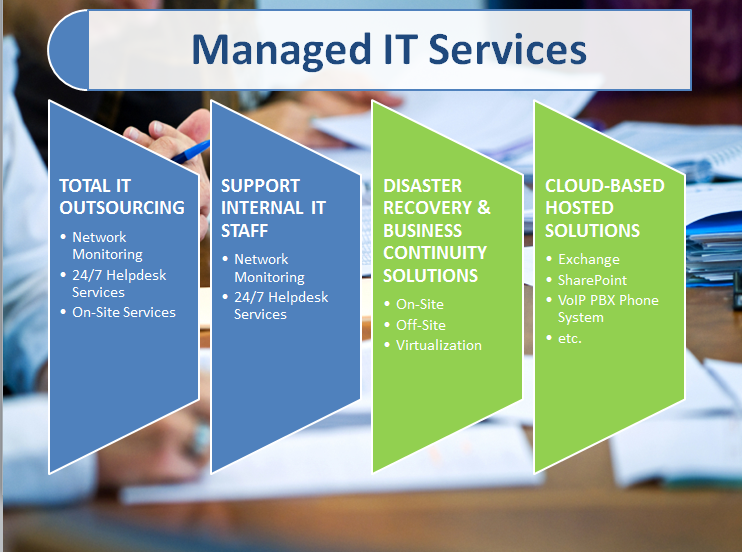Managed IT Services 2.0: The Future Outlook
In the current rapidly evolving technological landscape, businesses are progressively looking towards managed IT services as a strategic solution to keep pace with change. As companies endeavor for greater efficiency and competitiveness, the need for expert support and innovative solutions becomes paramount. Parried managed IT services is not just merely outsourcing IT; it's about a partnership that drives growth, enhances security, and leverages the latest advancements in technology.
Looking ahead, the future of managed IT services promises to be even more transformative. As artificial intelligence, cloud computing, and cybersecurity persist to evolve, these services will adapt to meet the requirements of businesses in a digital world. Organizations will benefit from enhanced agility, better resource management, and a proactive approach to IT challenges, allowing them to focus on their core missions while relying on knowledgeable partners to manage their technology environments.
Developments Influencing Managed IT Solutions
The expansion of cloud technology is substantially reshaping managed IT solutions. Businesses are more frequently moving their operations to the cloud for adaptability and growth. This move allows managed service providers to offer comprehensive solutions that effortlessly merge on-premises and cloud services. As businesses adopt multi-cloud strategies, they require the expertise of managed IT services to administer and enhance their cloud environments efficiently.
Automated solutions and machine learning are also playing pivotal roles in the evolution of managed IT solutions. By implementing automated solutions, service providers can streamline processes, enhance system monitoring, and minimize response times to issues. AI-driven analytics provide insightful results that support decision-making and resource allocation. This development not only enhances effectiveness but also allows IT teams to focus on strategic initiatives rather than routine chores.
Data protection is more critical than ever, influencing the environment of managed IT solutions. With the increasing incidence of cyber threats, businesses are emphasizing robust security protocols. Managed service providers are adapting to offer full data protection solutions that include threat detection, incident response, and compliance management. This heightened focus on defense ensures that companies can protect their information and maintain operational continuity in an constantly evolving risk landscape.

The Role of Automated Systems and Artificial Intelligence
The fusion of automated systems and artificial intelligence in managed IT services is transforming the landscape of tech management. By automating repetitive duties such as monitoring systems, software updates, and data backups, IT service providers can minimize errors caused by humans and lower operational costs. This allows IT teams to focus more on strategic initiatives and problem-solving, thus boosting overall productivity and quality of service. As organizations continue to expand, this transition towards automation helps them expand their operations without sacrificing service reliability.
AI is also transforming the way managed IT services operate. Through ML algorithms, AI can process vast amounts of information to identify patterns and anticipate potential issues before they occur. This anticipatory strategy not only helps in mitigating risks but also in optimizing resource allocation. For example, AI-driven data analysis can provide insights into system performance and user behavior, enabling providers to customize their offerings to meet specific requirements of customers more efficiently.
Furthermore, the future of IT management services will see increased cooperation between human skills and AI systems. While automated systems manages routine tasks and AI offers insights, human experts will remain essential in making key decisions and managing complex situations. The combination of human insight and sophisticated technology will lead to more innovative solutions, allowing IT management services to evolve into more dynamic and responsive offerings. This partnership is set to transform the way services are delivered and the experience of customers in the coming years.
Future Obstacles and Possibilities
The landscape of managed IT services is quickly evolving, bringing both difficulties and opportunities for service providers and clients alike. As tech keeps to progress, businesses will encounter increasing pressure to adapt to emerging tools and methodologies. This will necessitate supervised IT solutions to enhance their offerings with emerging technologies such as artificial intelligence and machine learning, which can optimize operations and provide more profound insights into system performance. However, the integration of these technologies may also confront providers to keep a equilibrium between mechanization and the requirement for customized customer service.
Cybersecurity continues to be a key concern in the future of supervised IT solutions. As threats become increasingly complex, organizations will need to focus on strong security measures within their IT infrastructure. This presents an chance for service providers to distinguish themselves by offering enhanced security solutions and proactive monitoring. The ability to offer comprehensive cybersecurity alongside traditional IT management can lead to strong client relationships and a strategic edge in the market.
Moreover, the transition towards working remotely and cloud-supported solutions has changed the way businesses operate. Managed IT services must adapt to this trend by offering flexible support and expandable solutions that serve distributed teams. This transformation creates new avenues for service offerings, such as virtual infrastructure management and cloud service optimization. In reacting to this movement, service providers can reveal significant growth opportunity while guaranteeing that clients stay agile and resilient in an ever more digital world.